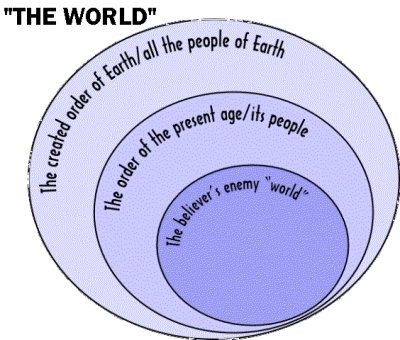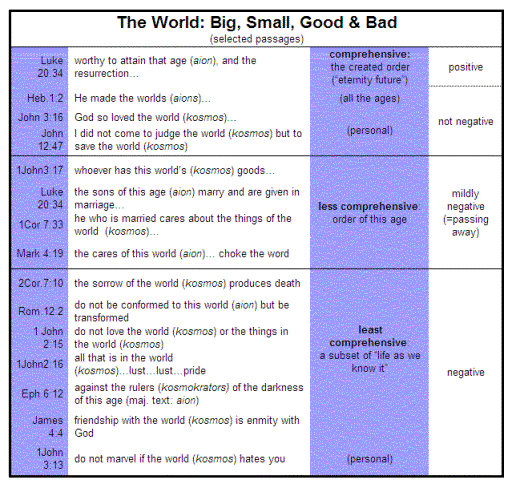What Does Worldly Look Like? Part 2
What Is Written
The meaning of “worldly” is a matter of some controversy. This is true even among people strongly committed to Christian living as defined in Scripture. Most agree that “worldly” means being like the world and that being like the world isn’t good. But from there, confusion multiplies.
The reasons for this confusion are several. The most important for our purposes is that the meaning of “worldly” depends on the meaning “the world,” and many are confused regarding what “the world” means. What exactly is it that disciples of Christ should not be “like”? How much does it have to do with garments, music, hairstyles, or theaters?
Important Words
In the NT, “world” usually translates one of three words: αἰών (aion), κόσμος (kosmos), and οἰκουμένη (oikoumene). All three vary in meaning depending on context. Of the three, oikoumene occurs the least frequently [1] and has the smallest range of meaning.[2] In every case, it emphasizes the world as a place, sometimes with the focus on the people who live there. Jesus uses the word in Matthew 24:14. “This gospel of the kingdom will be preached in all the world.” [3] Luke uses oikoumene in Luke 2:1 where he describes a census of all the “inhabited earth.” The most negative occurrence of the word is probably Revelation 12:9, where John informs us that Satan deceives “the whole world.” Oikoumene is never the preferred word when writers want to identify “the world” as an evil believers should resist.
Of the two remaining words, kosmos and aion, the latter has the smaller range of meaning. It always has a strong time connotation and is normally translated “age,” “forever,” “eternity,” etc. Context sometimes gives aion the broader sense of all reality during a period of time. In these passages, its meaning is closer to “world” than “age.” Paul uses the word for the temporary wisdom and rulers “of this age” (1 Cor. 2:6). Hebrews 1:2 tells us that God “made the worlds [αἰῶνας, aions].” The epistles contain several strongly negative references to aion, such as Rom.12:2, “do not be conformed to this world.”
The final key word is kosmos, the most common word for “world.” It is translated “world” everywhere but 1 Peter 3:3 (“adornment”), though it actually has the broadest range of meaning. While it always carries some sense of “ordered arrangement,” [4] it appears in “foundation of the world” (Heb. 4:3), “God so loved the world” (John 3:16), “the world hates you” (1 John 3:13), and “friendship with the world is enmity with God” (James 4:4). Many of the occurrences of kosmos are strongly negative in tone!
A Picture
When we pull of the data together, some patterns emerge. NT references to the world can be grouped under three headings: non-negative references, mildly negative references, and strongly negative references. Uses of “world” can also be grouped according to meaning. Three overlapping meanings are evident, each narrower in scope: the most comprehensive meaning (the God-created-Earth-order and/or all people who live there), a less comprehensive meaning (the order of this present age and/or all the people that live in it), and the least comprehensive meaning (everything in the world that is actively opposing the things of God). Interestingly, the negativity of the reference and the scope of the reference loosely correlate: that is, negativity of the tone grows as the size of what is meant by “world” shrinks.
The two charts that follow represent these observations visually.

What Is Written and What We Say
How does this understanding of “the world” in Scripture help us discern what is worldly? First, it helps us see how ways we use “the world” in our rhetoric differ from how Scripture uses the term. Second, it helps us narrow our focus to the passages that speak most directly about our relationship with the world.
We fundamentalists sometimes use “the world” and “worldly” in ways Scripture never does, and the results are self-contradiction and confusion. For example, speakers frequently label certain musical styles “worldly” and argue on that basis that believers should avoid those styles. The reasoning goes like this:
- Listening to rap music is worldly.
- Believers should not be worldly.
- So believers should not listen to rap.[5]
In this sequence of ideas, everything depends on premise A. B is not in dispute, so when A is accepted, C is a “no-brainer.” But oddly, speakers often put little effort into supporting assertion A. The same phenomenon occurs in reference to clothing styles, entertainment venues, etc. Hearers may say “Amen” because they already agree, and the validity of the argument doesn’t matter to them. Others walk away thinking they’ve heard something ridiculous. Why would a speaker reason this way and think he had said something persuasive?
The answer is that, to him, assertion A is obvious. But he believes it’s obvious because of a faulty underlying definition of “world.” Premise A is only obvious if “world” means something like “our society” or “unbelievers in general” or maybe “whatever is popular.” No one would dispute that rap is trendy, that a lot of people like it, or that it isn’t what believers have listened to in the past.
But this definition of “worldly” (being like whatever is trendy, popular, or mainstream in our society) breaks the chain of reasoning at premise B. “Believers should not be worldly” is only true if we have a biblical definition of “worldly,” and Scripture does not define “the world” we should we be unlike as “society” or “unbelievers in general” or “culture.”
Defining “world” and “worldly” in these ways is not only biblically unfounded but also impossible to practice consistently. The result is self-contradiction. Here is the same reasoning with terms defined:
- Rap is really popular.
- Believers should avoid what is really popular.
- So believers should avoid rap
Regardless of how we feel about rap, this way of thinking cannot work as an approach to our relationship with the world. Many things are popular. In our own society, driving SUVs is popular. Golfing is popular. Sixty years ago, wearing hats and neckties to ballgames was very popular. Going to church on Easter is popular.
The “world” that Scripture calls believers to oppose must be something other than cultural popularity. A survey of the passages that deal most directly with our relationship to “the world” underscores this and moves us closer to understanding which “world” should be the object of our consistent disapproval.
The “World” That Is the Believer’s Enemy
The New Testament reveals that the “world” we should oppose …
- Has Satan as its “god” and “ruler” (2 Cor. 4:4; John 12:31).
- Hates Christ and hates Christ’s followers (John 15:18-19; John 16:20; 1 John 3:13).
- Has “elements” that hold people in “bondage” (Gal. 4:3; Col. 2:20), and some or all of these are attitudes and ideas (Col. 2:8).
- Stains (from spilos, James 1:27), pollutes (miasma, 2 Pet. 2:20), and corrupts (phthora) by means of lust (2 Pet. 1:4).
- Includes a “course” of obedience to lusts of the flesh and mind that all believers used to walk (Eph. 2:2-3).
- Should not be “conformed” to by believers (Rom. 12:2).
- Includes spiritual powers that believers are at war against (Eph. 6:12).
- Is not to be loved by believers (1 John 2:15), and friendship with it and friendship with God are mutually exclusive (James 4:4).
- Consists of nothing but lust and pride (1 John 2:16).
Clearly, the “world” described by these passages is not everything and everyone in the created order as a whole, nor is it everything in the fallen order of the present age. Since unbelievers and the cultures they inhabit practice some good things as well as bad, the “world” in these passages is also not everything associated with unregenerate human beings in the present age or even everything that is popular among unbelievers.
The “world” Scripture warns believers to avoid at all costs has some other defining characteristic. This defining characteristic separates the “worldly” from the “not-worldly” in a believer’s culture and alerts him that non-conformity, overcoming, and keeping himself unspotted is the proper response.
This defining characteristic, the resulting view of worldliness, and the implications for our preaching and teaching about worldliness are the focus of Part 3.
__________
1. One word for “world” is used less frequently: γῆ (ge) is translated “world” once in the KJV (Rev. 13:3). Everywhere else it appears, even the KJV renders it earth, land, or the like. NAS, ESV, NKJV consistently render it earth, land, ground, soil, etc.
2. Rather than quoting lexical authorities here, I’m basing my observations on having looked them all up and read them in context.
3. Unless otherwise noted, Scripture quotations are from the NKJV.
4. TDNT indicates “order” is the basic idea in secular use (p. 459) but later asserts that “in the NT, kosmos never means ‘order’” (p. 462). However, it fails to explain how the idea of “order” went away, and the other senses of the word it cites in the NT still seem to orbit that center.
5. It isn’t really relevant, but if you must know, I loathe rap. “Rap music” is an oxymoron. ———–
———–
Aaron Blumer, a native of lower Michigan, is a graduate of Bob Jones University (Greenville, SC) and Central Baptist Theological Seminary (Plymouth, MN). He, his wife, and their two children live in small-town west Wisconsin where he has pastored Grace Baptist Church (Boyceville, WI) since 2000. Prior to serving as a pastor, Aaron taught school in Stone Mountain, Georgia, and served in customer service and technical support for Unisys Corporation (Eagan, MN). He enjoys science fiction, music, and dabbling in software engineering.
- 8 views


Discussion